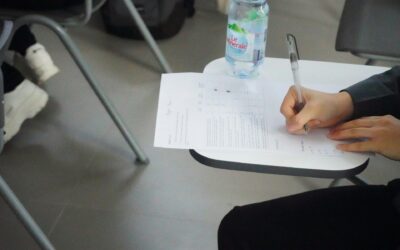Embarking on the journey of a medical career, one critical milestone you will encounter is the NBME CBSE or the Comprehensive Basic Science Examination. Often referred to colloquially as the “comp” exam, this pivotal test is a testament to your understanding of the foundational sciences that form the bedrock of medical knowledge. In this comprehensive guide, we will dive into what the CBSE entails, its importance in your medical education, and strategies to navigate and excel in this examination. So, let’s begin unraveling the facets of the CBSE and equip you with the insights needed to secure your best possible score.
Table of Contents
- What is the NBME CBSE?
- Understanding the CBSE Exam Structure
- When do I take the NBME CBSE?
- How long is the CBSE exam?
- Exam Content and Focus Areas
- How should I study for the CBSE?
- What study materials should I use for the NBME CBSE?
- Taking the Exam: Procedures and Tips
- How does the CBSE compare to the actual Step 1 exam?
- When will I receive my NBME CBSE score report?
- Understanding Your CBSE Score Report
- What do I do with my NBME CBSE exam results?
- Strategies for Improving Weak Areas in CBSE Exam Preparation
- Key Takeaways
What is the NBME CBSE?
The National Board of Medical Examiners’ Comprehensive Basic Science Examination, commonly known as the NBME CBSE, is a standardized test that serves as a critical checkpoint for medical students. It’s specifically designed to evaluate the foundational scientific knowledge that is essential for the practice of medicine. This exam is a crucial step in the journey of a medical student, as it assesses the understanding and application of basic science principles that are integral to the practice of medicine.
The CBSE is more than just an exam; it reflects a student’s grasp of the fundamental sciences that underpin medical practice. It tests knowledge acquired during the first two years of medical school, covering various topics from biochemistry and physiology to pharmacology and pathology. The CBSE’s role in preparing students for the USMLE Step 1 cannot be overstated. It assesses their current understanding and highlights areas that require further study, thereby guiding their preparation for one of the most important exams in their medical career.
Understanding the significance of the CBSE in a medical student’s education journey is crucial. It’s not just about passing an exam but about solidifying a foundation of knowledge that will support future clinical decision-making and patient care. The CBSE is an opportunity to gauge one’s readiness for the medical profession’s rigors and identify areas for growth and improvement.
Understanding the CBSE Exam Structure
The CBSE’s structure is meticulously designed to test various basic science concepts. Each of the 184 multiple-choice questions is carefully crafted to assess a student’s understanding and ability to apply foundational medical knowledge. These questions are split into four blocks, allowing focused testing periods and manageable pacing.
The exam’s structure also includes a mix of question types, ranging from direct recall of scientific facts to more complex, scenario-based questions that test application and analysis. This variety ensures a comprehensive assessment of a student’s knowledge base. It’s important to note that the question distribution follows a pattern that mirrors the emphasis of medical school curricula, with a balance between general principles and specific organ systems.
Preparing for this structured and diverse set of questions requires a multifaceted study approach. Students must be adept at both rote memorization of critical facts and the more challenging task of applying this knowledge to clinical scenarios. The block format of the exam necessitates practical time management skills, as each block must be completed within the allotted one-hour timeframe.
When do I take the NBME CBSE?
Determining the appropriate time to take the NBME CBSE depends mainly on the specific requirements of your medical school. Most institutions schedule this examination towards the end of the pre-clinical phase. Upon registering, students receive crucial scheduling instructions from the NBME, including a permit for accessing the examination.
Proactive engagement in both academic preparation and logistical planning is essential. Timely attention to the nuances of the registration process and strict adherence to deadlines are key to avoiding potential setbacks. Regularly consulting the NBME website and monitoring email communications for any updates or directives from the NBME is advisable for a smooth examination experience.
How long is the CBSE exam?
The CBSE exam, administered by the National Board of Medical Examiners, has the following structure:
- 184 multiple-choice questions
- Divided into 4 blocks
- Each block is 1 hour long
In comparison, the USMLE Step 1 exam, which the CBSE approximates in content, is structured as follows:
- 280 multiple-choice questions
- Divided into 7 blocks
- Each block is 1 hour long
CBSE is a shorter version of the Step 1 exam regarding the number of questions and the total time allotted for completion.
Exam Content and Focus Areas
The CBSE exam, administered by the National Board of Medical Examiners, has the following structThe CBSE covers a broad spectrum of topics, ensuring a comprehensive assessment of a student’s basic science knowledge. It includes biochemistry, molecular biology, genetics, pathology, pharmacology, and more. This wide-ranging content requires students to understand each subject area thoroughly.
Students should integrate knowledge from various disciplines to effectively prepare for this extensive content. This integration is critical to understanding how scientific principles interconnect and apply to medical practice. For example, a question on pharmacology might require an understanding biochemistry and physiology. Hence, a holistic approach to studying is essential.
In addition to content knowledge, students should be familiar with the format of the questions. This includes understanding how to approach different types of questions, such as those requiring recall of factual information versus those that test the application of knowledge in clinical scenarios.
How should I study for the CBSE?
When preparing for the CBSE, consider the following:
- GoldUSMLE’s CBSE Prep Course for Step 1 provides extensive practice and straightforward explanations
- Sketchy supports learning through visuals
- First Aid for Step 1 offers a comprehensive overview
- Pathoma is good for understanding diseases
The Comprehensive Basic Science Self-Assessment (CBSSA) is also a critical tool. It simulates the CBSE format, helping students to pinpoint areas of strength and weakness. A balanced study approach, blending active learning (like question practice and group discussions) with passive learning (such as reviewing textbooks) and regular self-assessment through practice exams, is vital to ensuring a well-rounded and effective preparation for the CBSE.
What study materials should I use for the NBME CBSE?
When preparing for the NBME CBSE, various study materials can be utilized to ensure a well-rounded understanding of the required content. Here are some recommended resources:
- Gold USMLE Review’s High Yield Notes, Video Lectures, and Live/Online Classes: These comprehensive resources offer an integrated approach to learning. The high-yield notes summarize vital concepts efficiently, while the video lectures provide in-depth explanations. The live and online classes offer interactive learning experiences, allowing real-time feedback and clarifying doubts.
- UWorld Step 1 Question Bank: This extensive collection of practice questions is accompanied by detailed explanations, helping students test their knowledge and understand the rationale behind each answer.
- Sketchy: This innovative resource uses visual storytelling to make complex medical topics memorable. The engaging, mnemonic-based illustrations are beneficial for visual learners.
- First Aid for USMLE Step 1: This book is a staple for medical students, offering a concise overview of all essential topics. It’s handy for quick reviews and last-minute revisions.
- Anki: This flashcard app supports spaced repetition, a learning technique that enhances long-term retention of information, making it ideal for memorizing high-yield facts.
- Boards and Beyond: With detailed video lectures covering a broad spectrum of basic medical sciences, this resource is excellent for understanding complex concepts.
- AMBOSS: This platform combines a comprehensive medical library with a question bank, offering an interactive way to study and apply medical knowledge.
Taking the Exam: Procedures and Tips
On the day of the CBSE, students must manage their time efficiently. Each of the four blocks must be completed within an hour, and it’s essential to pace oneself to ensure that all questions are answered. Time management during the exam is a skill that can be honed through practice exams.
Students should also be prepared for the physical and mental endurance required for the exam. It’s a prolonged test, and maintaining focus throughout is crucial. Strategies such as taking short breaks during the allocated time, staying hydrated, and having a good meal beforehand can be beneficial.
Before the exam, students should familiarize themselves with the testing center’s rules and regulations. Knowing what to expect on the exam day will reduce anxiety and allow students to focus on the test.
How does the CBSE compare to the actual Step 1 exam?
The Comprehensive Basic Science Examination (CBSE) and the United States Medical Licensing Examination (USMLE) Step 1 are designed by the National Board of Medical Examiners, contributing to their content and style similarities. Both exams assess foundational medical knowledge, covering biochemistry, pathology, and pharmacology.
Despite these similarities, there are notable differences. The CBSE is shorter, consisting of 184 multiple-choice questions compared to Step 1’s 280. Additionally, the CBSE focuses more on first-order questions with shorter vignettes, making it less complex than Step 1.
The CBSE plays a pivotal role for students as a preparatory measure for the Step 1 exam. It is an initial evaluation of their understanding of basic medical sciences, indicating their preparedness for the more intricate Step 1. With a format and content that mirrors Step 1, the CBSE acts as a significant benchmark, aiding students in gauging their readiness. It emphasizes first-order questions, allowing students to reinforce their foundational knowledge, which is crucial before they advance to the more complex analytical questions characteristic of Step 1.
When will I receive my NBME CBSE score report?
Students who take the NBME Comprehensive Basic Science Examination (CBSE) can expect to receive their score report approximately one week after the exam date. This prompt issuance of results allows students to quickly assess their performance and begin preparing for their next steps in medical education, whether that involves further review of specific topics or beginning preparations for USMLE Step 1.
The timely availability of the score report is crucial for students, as it provides them with a clear understanding of their strengths and weaknesses in the covered material, aiding in targeted study strategies for future exams.
Understanding Your CBSE Report Card
The score report from the CBSE is more than just a numerical score; it’s a comprehensive performance analysis across various subject areas. It provides a detailed breakdown of strengths and weaknesses, which is invaluable for future study planning. The report includes a visual performance profile representing students’ proficiency in different content areas.
Interpreting the score report correctly is crucial. Students should pay close attention to areas where they scored lower and allocate more study time to these topics. The score report also offers an approximate USMLE Step 1 equivalent score, helping students understand where they stand concerning this critical upcoming exam.
What do I do with my NBME CBSE exam results?
Once you receive your NBME CBSE exam results, they should be used strategically to enhance your preparation for the USMLE Step 1 exam. The key steps to follow are:
- Creating an Effective Study Plan: Utilize the score report to develop a study plan tailored to your needs. This involves identifying weaker areas highlighted in the Performance Profile and dedicating focused study time to these topics.
- Daily Review and Time Allocation: Allocate around 2-3 hours daily during your Step 1 study period to review and strengthen weak areas while maintaining a balance with other subjects.
- Continuous Assessment and Improvement: Regularly take NBME practice tests during your Step 1 study period. Compare these results with your CBSE score report to track improvements in previously weak areas and adjust your study plan accordingly.
- Learning and Growing from the Results: Instead of feeling discouraged by lower scores in certain areas, use this as a learning opportunity. Focus on turning these challenges into strengths, as this approach will make you a more competent test taker for the actual Step 1 exam.
Effectively utilizing your CBSE exam results ensures that you identify and improve upon your weak areas and gain a comprehensive understanding crucial for success in the USMLE Step 1.
Strategies for Improving Weak Areas in CBSE Exam Preparation
To enhance weak areas identified in the CBSE score report, students can consolidate their study strategies into five key areas:
1. Consolidated Revision and Prioritization: Combine quick revisions of core concepts with prioritizing lessons that need more attention. This approach ensures a thorough understanding and efficient use of study time.
2. Focused Practice with Important Questions: Emphasize practicing essential questions from each chapter, which aids in deepening comprehension and memorizing critical information.
3. Routine Study with Time Management: Allocate dedicated study times to improve focus and practice time management by solving solved and unsolved past papers. This helps in getting accustomed to the exam format and pacing.
4. Analytical Review and Self-Assessment: Regularly analyze performance in practice tests to identify strengths and weaknesses. Focus on areas that require more effort and leverage strengths to improve overall performance.
5. Clarity and Understanding: Ensure all concepts are crystal clear. Seek help from peers, teachers, or additional resources whenever doubts arise, as clarity in understanding directly translates to better exam performance.
KeyTakeaways
The concluding section should emphasize the importance of a well-rounded approach to preparing for the CBSE. It’s not just about studying hard but also about studying smart. This means utilizing various resources, practicing self-care, and maintaining a balanced lifestyle during preparation.
Additional resources can include forums, online communities, and further reading materials that offer deeper insights into the CBSE and USMLE Step 1 exams. Encouraging students to seek support from peers, mentors, and educators can also be a vital part of this section, reminding them that they are not alone in this challenging journey.




